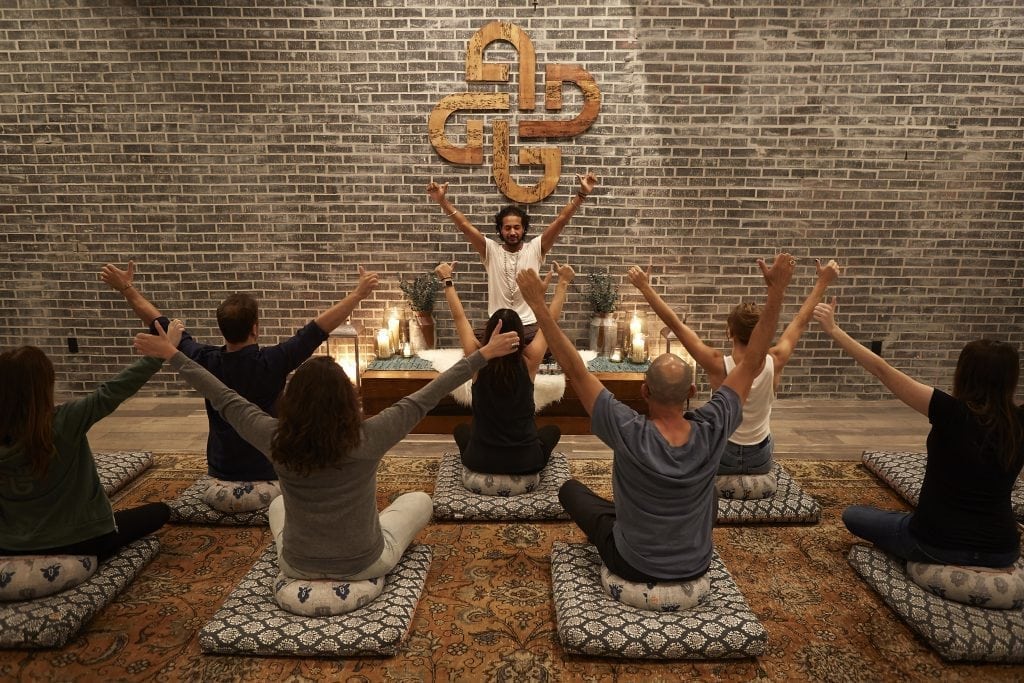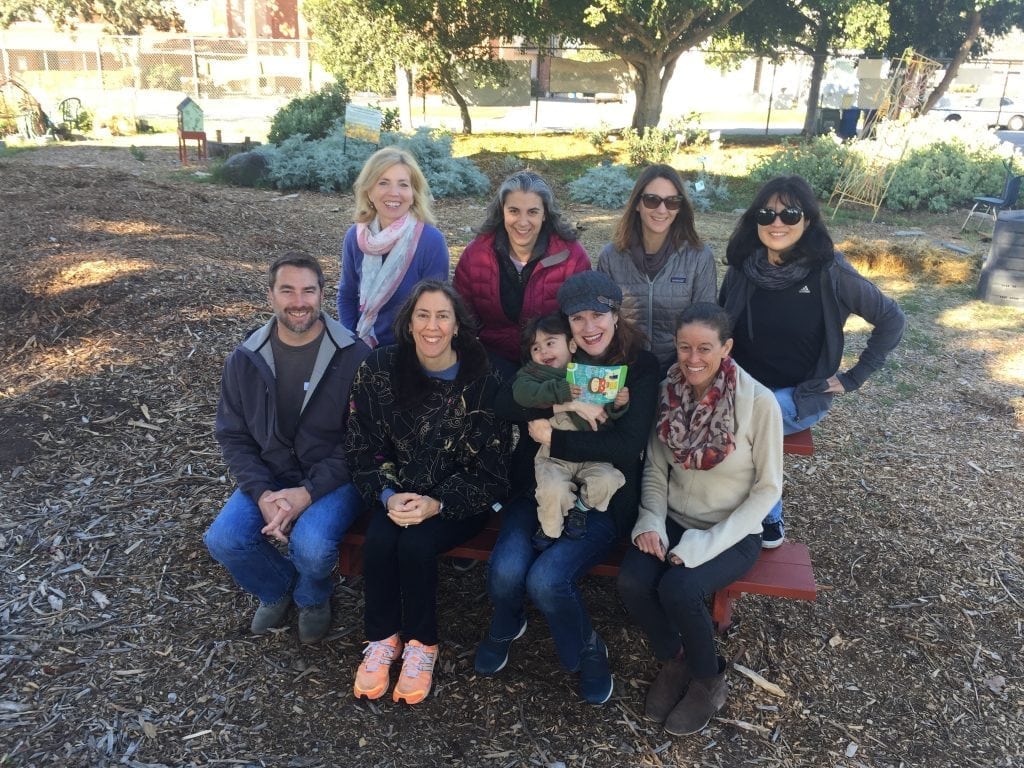
Tal Rabinowitz, a former entertainment executive at NBC, founded DEN Meditation, which offers many mindfulness opportunities. PHOTO COURTESY DEN MEDITATION
When I opened the door to DEN Meditation on a recent Saturday morning, feeling victorious because I found a parking space right in front (no easy feat on busy La Brea Avenue), I was greeted by the smell of essential oils and fresh flowers. My senses were awakened, which I learned is one of the central goals of a meditation practice.
This would be my first meditation class, and I looked forward with cautious optimism to leaving behind the bustle of the city, the demands of motherhood and the 22-point to-do list I wrote in my mind at 2 a.m. I’m a thinker. If I’m being honest, I’m an over thinker. I’m a planner, a worrier and a consummate what-if’er. The wisdom of my mother’s voice reminding me, “Don’t be so focused on tomorrow when there are enough problems of today” is drowned out by my unremitting belief that if I can simply find more hours in the day, I can do it all.
Amanda Gilbert’s Saturday morning mindfulness meditation is exactly the class for overly mental-active moms like me. I slipped into the candle-lit room filled with cushions, blankets and an oversized rug. About 20 of us, a culturally diverse group of men and women from young adult to senior, settled ourselves down on the cushions. I was relieved to learn I wasn’t the only one meditating for the first time.
Gilbert invited us to participate in an arrival sit: meeting the mind and body at its unique and present moment. I immediately noted how good it felt to sit in the position my 4-year-old calls “crisscross applesauce.” The slight stretch of my thighs called upon muscles I typically only use to press the brake or the gas pedal along my lengthy city commute.
In a calm voice, Gilbert started speaking of kindness and non-judgment as if she knew my mind was already beginning to wander to all the “shoulds” in my life – the things I should be doing, should be taking care of, should be addressing instead of giving myself these 45 minutes to be in the studio with a full heart. “Find your way to your breath and your body,” she said. “With a clear and vital attention to inhale and exhale, notice where your attention goes and then bring it back to the breath. When it wanders, bring it back to the breath.”
Something about the confidence with which Gilbert offered her instruction, as if she believed we all could indeed rein in our thoughts, provided comfort for my frenzied mind. It wasn’t easy, but with gratitude I eventually found entire minutes where I felt acutely aware of the very moment I was in. As a newcomer, I was coming to appreciate the effectual practice of mindfulness.
The Foundation for a Mindfulness Society defines mindfulness as “the basic human ability to be fully present, aware of where we are and what we’re doing, and not overly reactive or overwhelmed by what’s going on around us.” Gilbert explains that mindfulness allows parents to “come up with less reactive and more creative solutions while also understanding they are doing the best they can.” This compassionate affirmation inspired me to delve even deeper into the exploration of mindfulness. It would be impossible to detail all its many benefits in this space, but here are a few ways that mindfulness might appear in the real life of a busy mom.
Mindfulness Fuels Acceptance
“Mindfulness includes a component of allowing things to be exactly as they are, which fuels acceptance rather than fighting against what is,” says psychotherapist and mom Elaine Barrington. She offers mindfulness strategies through her private practice (elainebarrington.com); workshops at the Santa Monica meditation center Insight LA, where parents can engage in mindful sitting, followed by discussions around practice and parenting; and a Monday morning mindfulness group for parents at her children’s elementary school in L.A.

Mary Aggarwal, mother of four, founded Parentcirkle. Online workshops include a “Mindful Mama” session. PHOTO COURTESY MARY AGGARWAL
Acceptance slows the hectic pace of parenting so that we can better evaluate our responses to situations and fosters the patience necessary to acknowledge our children’s diverse personalities. “Often times, we can project so much on to our kids – what we wish for them and what we hope for them – that we don’t allow them to be who they are,” Barrington says. This means we are shouldering the burden of our children’s identity as well as our own, which heightens the pressure and the stress of parenting. When we are more patient and accepting, we can de-escalate circumstances and model for our children how to regulate their own emotions, too.
Starting each day with mindful intentions can help jumpstart this acceptance. Whether that means using the few minutes in the morning when you brush your teeth to gently focus on the sensations of the toothbrush or setting aside five minutes of solitude to help prepare for the adventures of the day, mindfulness can equip busy parents with the ability to accept whatever challenges await them.
Mindfulness Slows Things Down
Society depicts modern parents as plate-spinning performers juggling multiple plates on a world stage. The more plates you juggle, the better parent you are, and you get brownie points if you make it look easy.
Mindfulness provides parents with permission to slow the plate spinning or even put the plates down. “The simplest definition of mindfulness is to be present in the right now,” says Mary Aggarwal, mother of four and founder and CEO of Parentcirkle Inc., a network of peer support combining parent-coaching services with a video-conferencing platform. To do this, we must slow the pace, thereby maintaining a healthy connection to our feelings and ourselves.
Mindfulness is the constant practice of learning to remain in the present even when it can be difficult, or when we are tempted to avoid circumstances where we may not have the answers. We can do this by finding time to lessen the haste, to breathe, to give ourselves a break from technology or just check into our senses, sit in a chair, touch our face, acknowledge the sounds around us. For those of us spending time in the car, Gilbert advises, “Periodically turn off the radio. Bring your attention to the activity around you. Every red light is an opportunity to stop, check in with yourself, your breathing and any tension being carried in your body.”
Mindfulness Promotes Self-Care
Aggarwal says mindfulness not only has the power to improve our relationships, but also can serve as a reminder to prioritize ourselves. “Through practicing mindfulness, we can choose not to let our thoughts be pulled everywhere, and instead become empowered to drive our lives in the direction of our choosing,” she says. This way, we can better tend to our needs and ideally achieve happiness.
Aggarwal knows about making choices and having to learn to choose herself. She was inspired to launch Parentcirkle.com after her own experiences of isolation during her pregnancies. A “Mindful Mama” session facilitated by Parentcirckle coach Korie Leigh, Ph.D., strives to empower parents with the tools to shift everyday occurrences into acts of mindful awareness. For each parent, mindful practices may present themselves in different ways. Fortunately, there are tons of resources for busy moms and dads who wish to incorporate mindfulness into their self-care plans.
Mindfulness Helps Regulate Emotions
Tal Rabinowitz, founder of DEN Meditation and a former entertainment executive at NBC, knows a thing or two about the importance of maintaining perspective, finding clarity and staying true to one’s heart. She prides herself on running a meditation studio that makes everyone feel welcome.
She applies the principles of mindfulness to her parenting as well – even during difficult moments. “You aren’t your child’s emotions,” she says. “If you feel yourself getting frustrated, identify that feeling, notice where it is in your body and then breathe into that space.”

Psychotherapist Elaine Barrington, back row, second from left, leads a Monday morning mindfulness group at her children’s elementary school. PHOTO COURTESY ELAINE BARRINGTON
Rabinowitz also suggests teaching children to tune in to their emotions. “Let them feel what they are feeling and help them identify those feelings,” she says. “Basically, you are teaching them at an early age not to avoid emotion, yet not to let it control them either.” This also teaches compassion. Through mindful strategies, children can become aware of their own reactions and how their actions can make others feel. The more children observe their parents being mindful – taking time out, building support systems and modeling healthy habits – the more inclined they will be to want to reap their own mindful rewards.
You Can be Mindful Right Now
When we think of mindfulness, we often think of a person sitting in a lotus position with an indeterminate amount of time to focus on their meditation. While carving out more formal moments of mindfulness can prove beneficial, informal mindfulness, where we approach everyday activities with purpose, can help invite mindfulness into our busy, parent-centered lives. The sensory awareness inspired by cooking or washing dishes can cultivate curiosity and help alleviate some of the boredom of mundane chores. Tapping into the movement and rhythm of chopping vegetables or sweeping the floor can invite a harmonious exchange between our breath and the movement of our bodies. Additionally, becoming better listeners, whether to our own thoughts or the thoughts of others, and even taking a break from talking all together, if only for the time it takes to fold the laundry, can help foster mindfulness. For more resources, UCLA’s Mindful Awareness Research Center (MARC) provides free guided meditations that can be accessed anywhere for a few minutes a day.
Upon exiting DEN Meditation, I saw another mom circling the block looking for a place to park. I caught her eye as she peered from her SUV filled with toddler-size car seats. I waved and pointed to my parking spot, indicating that I was leaving.
As I stepped off the curb, squinting at the brilliance of the L.A. sun, I dug into my wallet for two quarters to feed the meter. I then waited in my car until I saw her come around the bend. In my first meditation class, I learned the benefits of gifting oneself just a little bit of time. The least I could do was gift a fellow mom some more time, too. It’s the one thing we can’t replace, and for that reason, being fully attentive, if only for a moment, is the one thing we all need the most.
Ryane Nicole Granados is a Los Angeles native whose work has been featured in The Manifest-Station, Mutha Magazine, The Good Men Project, Expressing Motherhood, The Nervous Breakdown, Scary Mommy and L.A. Parent.



























